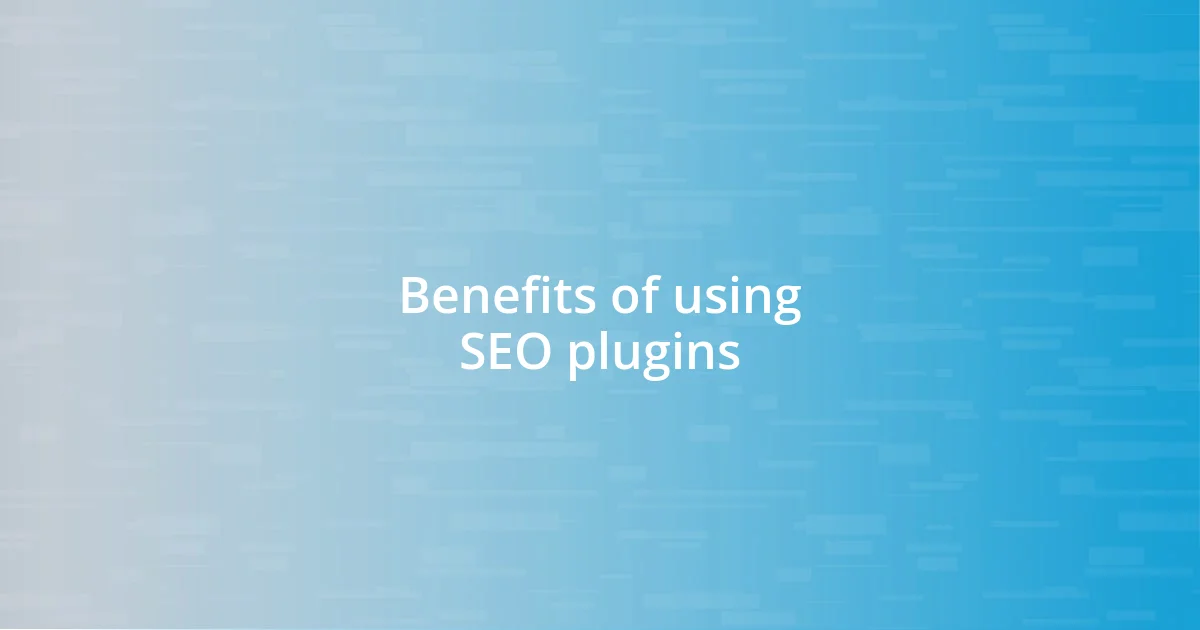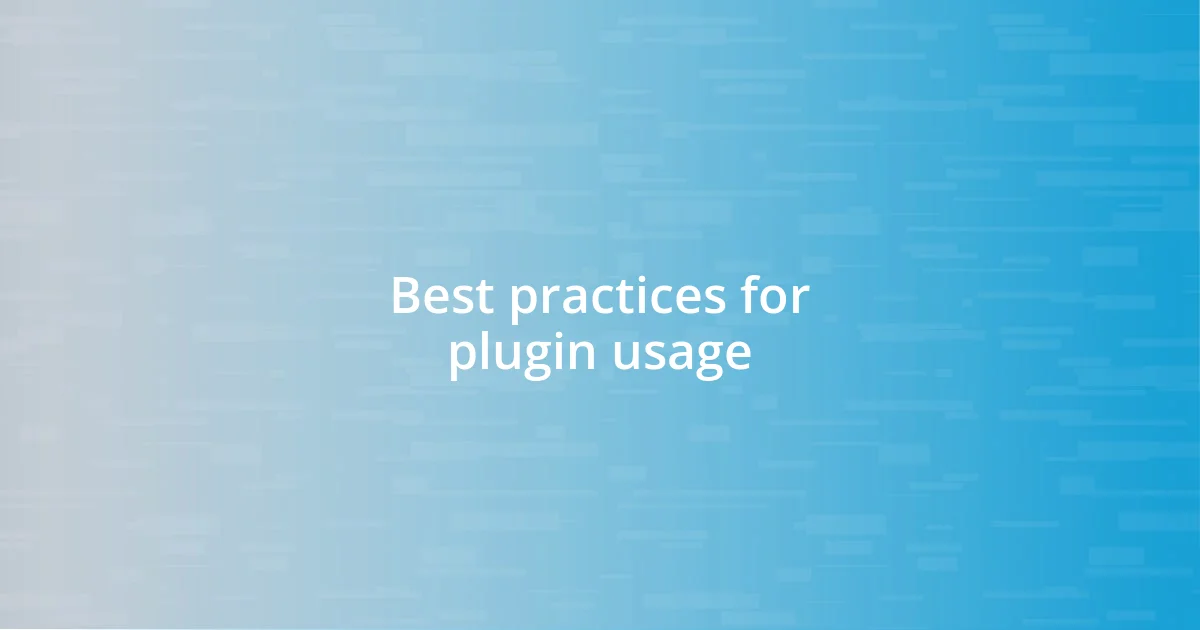Key takeaways:
- SEO plugins enhance website visibility and streamline the optimization process, enabling users to focus on content creation while improving keyword strategy and readability.
- Choosing the right SEO plugin involves understanding personal needs; popular options like Yoast, Rank Math, and All in One SEO offer unique features catering to different user preferences.
- Regularly evaluate and optimize plugin settings to avoid conflicts, ensure compatibility, and leverage documentation, which leads to improved site performance and effective SEO strategies.

Understanding SEO plugins
SEO plugins are essential tools for anyone looking to improve their website’s visibility. I remember the first time I installed an SEO plugin; it was like turning on a light in a dark room. Suddenly, I could see all the areas where my site needed attention—keywords, metadata, and readability scores became much clearer. Isn’t it fascinating how a simple addition can transform the way you approach your online presence?
When I think about it, SEO plugins serve not just as guides but also as coaches, nudging me to optimize content effectively. I’ve often wondered, how many great pieces of content never see the light of day simply because they lacked proper optimization? It’s a sobering thought that reminds me how important these tools really are for driving traffic and engagement.
With various options available, choosing the right SEO plugin can feel overwhelming. From Yoast to All in One SEO, each offers unique features that cater to different needs. I once spent hours experimenting with the settings of multiple plugins, and I found that it’s not just about the tool—it’s how you leverage its capabilities that truly counts. This exploration made me appreciate the nuances involved in effective SEO strategies.

Benefits of using SEO plugins
Using SEO plugins can really simplify the often daunting process of optimizing your website. Personally, I find their user-friendly interfaces and straightforward suggestions indispensable. For instance, after installing my first plugin, I was amazed at how it streamlined my workflow, helping me focus on creating valuable content rather than obsessing over complex SEO tactics.
One of the key benefits I’ve noticed is the performance tracking they offer. These plugins not only help you identify high-performing keywords but also analyze how your content ranks against competitors. I recall a time when one plugin alerted me that a keyword I was targeting had extremely high competition. This insight prompted me to pivot my strategy, saving me time and, ultimately, leading to greater visibility in search results.
Moreover, SEO plugins often come with built-in suggestions for optimizing images and links, which I find incredibly valuable. There was a moment when I uploaded an image without proper alt text, only to have the plugin prompt me about it. That small correction made a huge difference! It’s a reminder that effective SEO isn’t just about the text; the little details matter just as much.
| Benefit | Description |
|---|---|
| User-friendly interface | Simplifies the SEO process, allowing focus on content creation. |
| Performance tracking | Allows analysis of keyword effectiveness and competitor performance. |
| Image and link optimization | Prompts corrections for elements like alt text, enhancing overall SEO. |

Comparing top SEO plugins
When comparing top SEO plugins, it’s clear that each has its strengths and target audience. For instance, while I’ve enjoyed the comprehensive features of Yoast SEO, I found that Rank Math’s clean interface resonates more with those who prefer a minimalist approach. In my experience, finding the right plugin is much like selecting the right tool from a toolbox; it all depends on the job at hand and your personal comfort level.
Here’s a quick comparison of the plugins I’ve explored:
- Yoast SEO: Offers robust analysis tools and readability checks, helping you craft content that resonates with your audience and search engines alike.
- Rank Math: Combines powerful features with a user-friendly dashboard, making it simple for beginners but also rich enough for advanced users.
- All in One SEO Pack: An excellent option for those who want essential SEO features without any frills, which simplifies the initial learning curve.
During my exploration of these plugins, I actually stumbled upon a feature in Rank Math that allowed me to optimize my content in real-time. The feeling of publishing a post with confidence, knowing that it had been fine-tuned for search visibility, was incredibly rewarding. It’s moments like these that remind me of why choosing the right SEO plugin matters so much; it can genuinely elevate your content strategy.

How to optimize plugin settings
Optimizing your SEO plugin settings can really make a difference in your site’s visibility. I remember the first time I dove into the settings of my plugin; it felt a bit overwhelming. But as I started tweaking the options, like adjusting the focus keywords and title settings, I could see how these small changes could enhance my SEO strategy.
One key area to focus on is the readability analysis feature. This aspect often feels like the plugin is offering you a direct line into what your audience is experiencing. I can’t help but smile when I remember improving my content score from red to green simply by following the suggestions. It reinforced my belief that plugins are not just tools; they’re amazing companions in the journey of optimization.
Don’t forget to explore the advanced settings for image optimization as well. One time, a plugin reminded me to add descriptive alt text to an image I’d uploaded, something I had completely overlooked. Taking just a few extra moments to adjust that made me realize how critical these details are for both SEO and user experience. Have you looked at those settings yet? If you haven’t, it could be the key to enhancing your site further!

Best practices for plugin usage
It’s essential to regularly evaluate the plugins you’re using. I remember a time when I had several SEO plugins running simultaneously, and it created conflicts that slowed down my website. Once I streamlined my choices, focusing on just one or two, I noticed not only speed improvements but also a clearer understanding of my optimization process. Have you checked if you have redundant plugins?
When using SEO plugins, always keep your goals in mind. I find it helpful to set specific targets before diving into the settings. For example, when I aimed to boost my organic traffic, I concentrated on features that enhanced my keyword strategy. It’s invigorating to see your efforts translate into real results. What targets are you aiming for in your SEO journey?
Don’t overlook the documentation available for your SEO plugins. I recall feeling puzzled about a feature until I spent some time exploring the user guides. That simple investment of time paid off tenfold when I finally understood how to leverage the plugin’s full potential. Have you ever taken the time to dive into a plugin’s support resources? They can be incredibly enlightening!

Troubleshooting common plugin issues
Sometimes, despite our best efforts, plugin issues can crop up unexpectedly. I remember a frustrating evening when a sudden conflict arose after a plugin update, causing my site to crash. It taught me the importance of keeping a backup before any updates—this way, I could easily restore my site and quickly get back to optimizing without losing time or momentum. Have you backed up your site before making changes? It can save you a lot of trouble.
Another common issue I’ve encountered is slow loading times due to poorly optimized plugins. On one occasion, I noticed a significant delay when loading pages, which made me rethink my plugin choices. By selectively disabling certain plugins one by one, I pinpointed the culprit and managed to improve my site speed dramatically. It’s amazing how a single plugin can impact the entire user experience. Have you tested your site’s loading speed lately?
Regularly checking compatibility with your WordPress version is also essential. I once ignored this, only to find that a plugin I heavily relied on became outdated and caused functionality issues on my site. From that point onward, I made it a habit to verify updates and compatibility notes from the developers. It’s a simple practice that can save you from headaches down the line. Have you taken a moment to look at your plugins’ compatibility with the latest version of WordPress? It’s worth it!














